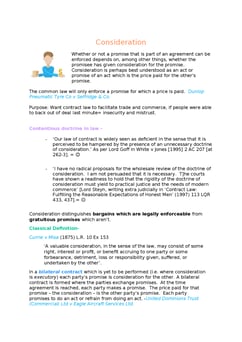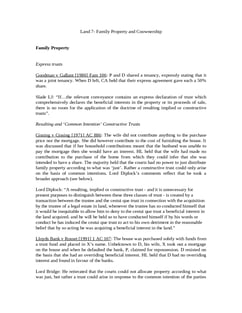Pascoe v Turner [1979] 1 WLR 431
Judgement for the case Pascoe v Turner
Table Of Contents
KEY POINTS
In estoppel-related legal proceedings, the principle of estoppel by conduct is crucial. This doctrine comes into play when one party's actions or assurances cause another party to rely on them to their detriment. In a specific cohabitation scenario, a house owner assured their former partner that the house and its contents belonged to her. Relying on this assurance, the former partner invested money in the house, expecting a future gift.
The situation takes a legal turn when the owner later seeks possession of the house, prompting the question of whether equitable estoppel is applicable. Equitable estoppel prevents the owner from retracting assurances if it would be unconscionable to do so. The court must weigh the equitable considerations, determining how the principles of estoppel should be applied.
Wielding its authority, the court can decide how equity should be satisfied. This involves evaluating the former partner's financial contributions and the expectations fostered by the owner's conduct. The court's role is to strike a fair balance, considering the equities at play, to ensure the expectations induced by the owner's conduct are properly addressed, leading to a just resolution.
FACTS
Samuel Oswald Pascoe (‘Plaintiff’), a property investor, befriended Turner (‘Defendant’), a widow, in 1961. She became his housekeeper in 1963, and they began cohabiting in 1964. In 1965, the Plaintiff bought a house based on the Defendant's input, and they lived there together.
Despite providing a housekeeping allowance, Defendant used her funds for personal expenses and managed rent for Plaintiff. In 1973, Plaintiff had an affair, temporarily sharing the house with his new partner during Defendant's holiday. Upon her return, he assured her the house was hers. Relying on this, she invested in improvements. Despite the Plaintiff's claim of initiating a transfer through a solicitor, no documentation occurred.
In 1976, Plaintiff sought to end Defendant's house license, leading to legal action.
The court dismissed the case, determining Plaintiff had gifted the house contents to Defendant. A constructive trust was inferred from their words and conduct, granting the Defendant a beneficial interest in the house.
JUDGEMENT
Upon appeal by the Plaintiff, it was held that the appeal was dismissed. The court found that, as there were no supporting documents for Plaintiff's claim that he had given the house to Defendant, the alleged gift had not been perfected.
In 1973, the Defendant occupied the house under a license revocable at will. Although the circumstances did not support the inference of a trust, the period between 1973 and 1976, during which the plaintiff encouraged or acquiesced in the Defendant's improvements to the house under the belief that she owned the property, created an estoppel.
The court deemed it necessary to enforce the minimum equity to serve justice to the Defendant, compelling the plaintiff to fulfill his promises by ordering him to convey the property to the Defendant.
COMMENTARY
In the Pascoe v Turner case, a complex legal scenario arose from the relationship between property investor Samuel Oswald Pascoe and widow Turner, evolving in the early 1960s.
Pascoe purchased a house in 1965, and despite financial contributions from Turner, legal disputes emerged in 1976. The court initially ruled favor of Turner, recognizing a gift and constructive trust.
On appeal, Pascoe's claims lacked documentation, and the court, dismissing the appeal, emphasized an estoppel created between 1973 and 1976.
The court invoked the minimum equity principle to ensure justice, ordering Pascoe to convey the property to Turner highlighting the importance of legal formalities in property transactions.
ORIGINAL ANALYSIS
Mrs. Turner had been Mr. Pascoe’s housekeeper and subsequently cohabited with him. After ten years of living together, he eventually informed her that he was leaving her to move in with a new woman. Mrs. Turner was very distressed but was somewhat consoled when Mr. Pascoe informed her clearly, in front of witnesses, that the house and everything in it was hers. She made several improvements to the house, incurring expense.
He then told her that he was determining her license to remain and she had to leave within 2 months.
CA was a clear case of proprietary estoppel and the minimum equity to do justice to her was to order the conveyance of the property as he had promised.
Cumming Bruce LJ
In determining the appropriate measure of relief:
The court should consider all the circumstances, and Mrs. Turner having at law no perfected gift or licence other than a licence revocable at will, the court must decide what is the minimum equity to do justice to her having regard to the way in which she changed her position for the worse by reason of the acquiescence and encouragement of the legal owner.
i.e. whatever is equitable in the circumstances.
In this case, granting her a licence to remain would be inadequate since Mr. Pascoe could sell the house and a new purchaser would not necessarily be bound to honour her interest.
For Further Study on Pascoe v Turner
Need instant answers? Our AI exam tutor is here to help.
Ask questions 🙋 Get answers 📔 It's simple 👁️👄👁️
Our AI is educated by the highest scoring students across all subjects and schools. Join hundreds of your peers today.
Get StartedRelated Product Samples
These product samples contain the same concepts we cover in this case.
| Contract Law | Promissory Estoppel Notes (6 pages) |


 Since 2010, Oxbridge Notes has been a trusted education marketplace, supplying high-quality materials from top achievers at universities like Oxford, Cambridge, LSE, Harvard, and Yale.
Since 2010, Oxbridge Notes has been a trusted education marketplace, supplying high-quality materials from top achievers at universities like Oxford, Cambridge, LSE, Harvard, and Yale.